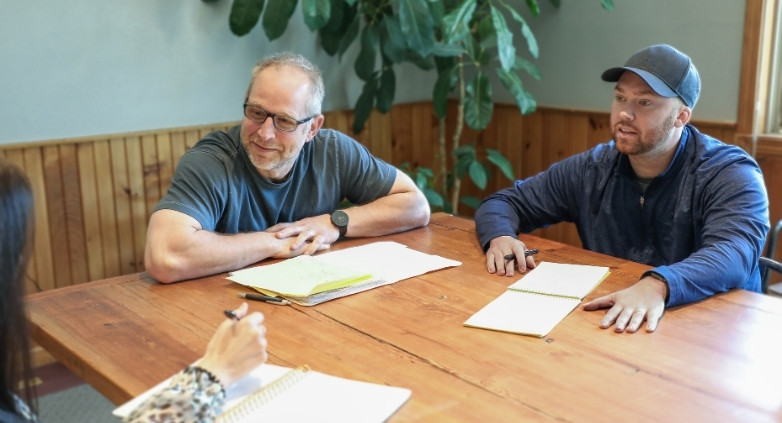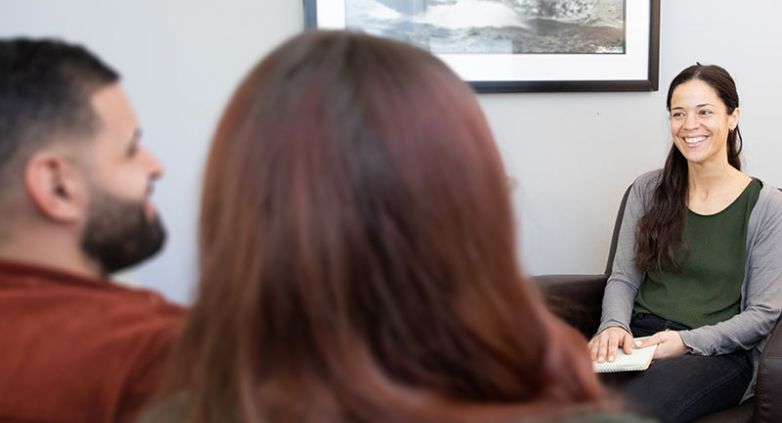
Family Therapy for Addiction – Rebuilding Trust & Healing the Home
When a loved one struggles with substance use, they are not the only ones who suffer. Addiction is a family disease that ripples through every relationship in the house. It changes how you talk, how you trust, and how you live.
Family therapy for addiction is not about pointing fingers or placing blame. Instead, it is a clinical approach that treats the entire “system” of the home. According to SAMHSA, involving family members in the recovery process significantly improves the chances of long-term sobriety. By understanding the effects of drug addiction on family members, you can begin to heal the collective trauma and build a stronger foundation for the future.
Read on to discover how modern therapy models can help your family move from crisis to connection.
Table of Contents
- The “Big Three” Goals of Family Therapy
- The 4 Evidence-Based Models of Family Therapy
- Breaking the Cycle: Addressing Roles and Boundaries
- Special Situations: Parents, Children, and Spouses
- Virtual and In-Home Recovery Options
- Frequently Asked Questions
- Conclusion: A New Path Forward
Free Download
Proven Programs for Lasting Recovery
Receive your free guide to understanding alcohol addiction and discovering recovery programs tailored to you. Learn how to build a personal sobriety plan and get support every step of the way.
1. The “Big Three” Goals of Family Therapy
Before diving into specific models, it helps to understand what family therapy actually does. It generally focuses on three main pillars:
- Education: Families learn about the neurobiology of addiction. This helps replace anger with an understanding of how the brain changes during substance use.
- Communication: Therapy provides a safe space to practice “I” statements and active listening. This reduces the constant cycle of arguing and defending.
- Coping Skills: Every member learns how to manage their own stress. This prevents the family from “revolving” around the addict’s moods and choices.

2. The 4 Evidence-Based Models of Family Therapy
In the world of clinical recovery, “evidence-based” means these methods are proven to work through years of scientific study. Not every family needs the same approach. Depending on your situation, a therapist might use one of these four powerful models to help your household heal.
1. CRAFT (Community Reinforcement and Family Training)
CRAFT is one of the most successful ways to help a loved one who refuses to go to treatment. Instead of a high-pressure “intervention,” CRAFT teaches you how to use positive reinforcement. You learn to reward sober behavior and allow natural consequences to happen when they drink or use drugs. Research from NIDA shows that CRAFT is significantly more effective at getting people into treatment than traditional methods.
2. BCT (Behavioral Couples Therapy)
If the addiction is affecting a marriage or partnership, BCT is the gold standard. It focuses on the “Recovery Contract.” This is a daily promise where the partner supports the individual’s sobriety, and both work on shared goals. By improving the relationship, you create a stable environment that reduces the urge to use. It is a vital tool when being married to an alcoholic has damaged the bond of trust.
3. FFT (Functional Family Therapy)
This model is specifically designed for families with teenagers or young adults. It looks at how the family interacts as a whole. Instead of blaming the teen, FFT identifies the “function” of the behavior. For example, a teen might use substances to cope with children of alcoholic parents dynamics in the home. FFT helps everyone change their patterns to create a calmer, safer space.
4. MDFT (Multidimensional Family Therapy)
MDFT is a holistic approach. It doesn’t just stay in the therapist’s office. It looks at the individual, the parents, and how the family interacts with school, work, or the legal system. It is highly effective for how to help an alcoholic son or daughter who is struggling across multiple areas of their life.
Real people. Real support.
Seeking Help for Yourself or a Loved One?
Connect with our professionals to start the journey to recovery.
Call 860.388.9656 for immediate support.
3. Breaking the Cycle: Addressing Roles and Boundaries
When addiction enters a home, the family often shifts into “survival mode.” To keep the peace, members unconsciously take on specific family roles in addiction. Breaking the cycle requires identifying these roles and replacing them with healthy boundaries in addiction recovery.
Identifying Survival Roles
Most families in crisis fall into one of these four patterns:
- The Enabler: Often a spouse or parent who covers up for the addict, pays their bills, or makes excuses to protect them from “natural consequences.”
- The Hero: Usually the oldest child who tries to be “perfect” to distract from the pain at home.
- The Scapegoat: The family member who acts out or gets into trouble, drawing focus away from the addiction.
- The Lost Child: The quiet one who stays out of the way, often suffering in silence.
Setting Healthy Boundaries
Recovery cannot happen without boundaries. A boundary is not a punishment for the addict; it is a rule for your own well-being. According to the American Association for Marriage and Family Therapy (AAMFT), setting limits helps stop the cycle of enabling and forces the individual to face the reality of their choices.
- Enabling vs. Supporting: Supporting means helping someone do something they cannot do for themselves. Enabling is doing something for them that they should do for themselves.
- The “No” Power: Learning to say no to financial bailouts or lying to employers is often the first step in how to help an addict without enabling.
4. Special Situations: Parents, Children, and Spouses
The approach to therapy changes depending on your relationship with the person struggling. Each bond has its own unique triggers and needs.
- For Parents: If you are learning how to help an alcoholic son or daughter, therapy focuses on letting go of the need to “fix” them while still offering a path to treatment.
- For Spouses: Couples therapy is essential for being married to an alcoholic. It addresses the loss of intimacy and the constant feeling of “walking on eggshells.”
- For Children: Being the son of an alcoholic or daughter can leave deep emotional scars. Therapy helps adult children process the effects of drug addiction on family members and develop their own identity outside of the family crisis.

5. Virtual and In-Home Recovery Options
In the past, family therapy meant everyone piling into a car and driving to a clinic. Today, modern technology and specialized care models make it easier to get help without disrupting your life. According to research published in the Journal of Substance Abuse Treatment, virtual and home-based interventions show high rates of engagement because they lower the “barrier to entry” for busy families.
- Flexibility: Programs like Intensive Outpatient Programs (IOP) often offer evening sessions, ensuring that your career or education doesn’t have to stop while you heal.
- Virtual Therapy: Many families now use virtual addiction recovery programs to connect from different locations. This is perfect for families with adult children living in other cities or for parents who cannot leave the house due to work or childcare.
- In-Home Recovery Services: Sometimes, the best place to heal is where the problems started. In-home recovery services bring the therapist to your living room. This allows the professional to see the family’s natural environment and provide real-time coaching for high-stress moments.
When Is Family Therapy Not Recommended?
Although powerful, family therapy is not a cure-all. Clinicians typically postpone or modify it when:
- Active Domestic Violence or Threats of Harm – Safety takes precedence; individual work and specialized safety planning must come first.
- Untreated Psychosis or Severe Cognitive Impairment – These conditions can prevent constructive dialogue until stabilized with medical care.
- Extreme Relational Cut-Off – If certain members categorically refuse contact, forcing joint sessions can backfire; parallel individual therapies may be safer.
- Court-Ordered No-Contact Mandates – Legal constraints sometimes require separate treatment tracks.
- Lack of Genuine Consent – Family therapy relies on voluntary participation; coerced attendance rarely produces lasting change.
In such cases, therapists usually begin with individual counseling, crisis intervention, or couples work until the environment is stable enough for group sessions.

Frequently Asked Questions
Yes. Using models like CRAFT, families can learn how to help an alcoholic family member even if that person isn’t ready for treatment yet. By changing your own reactions and boundaries, you can often influence their desire to seek help.
It’s best to talk when everyone is sober and calm. Avoid “you” statements that sound like accusations. Instead, focus on your own feelings. If you need a script, our guide on how to talk to a family member about their addiction can help you prepare.
Most major insurance plans cover family therapy as part of behavioral health benefits. At Project Courage, we can help you navigate addiction treatment in Connecticut and find a plan that fits your budget.
The length of family therapy varies depending on the severity of the addiction and the family dynamics involved. Some families attend therapy for a few months, while others continue for a year or longer. Many evidence-based models, such as Functional Family Therapy (FFT) or Multidimensional Family Therapy (MDFT), follow structured programs that typically last between 12 and 24 sessions. The goal is not just short-term stability but long-term change in communication patterns and boundaries.
A typical session lasts between 50 and 90 minutes and is guided by a licensed therapist. The session may include discussing recent challenges, practicing communication skills, identifying unhealthy family roles, and setting new boundaries. Therapists may also assign exercises to practice at home so families can apply what they learn between sessions.
Free Download
Proven Programs for Lasting Recovery
Receive your free guide to understanding alcohol addiction and discovering recovery programs tailored to you. Learn how to build a personal sobriety plan and get support every step of the way.
Conclusion: A New Path Forward
Addiction may be a family disease, but recovery is a family victory. By moving away from blame and toward evidence-based support, you can rebuild the trust that was lost. Whether you are looking for support groups for families of addicts or a more structured family therapy program, the most important step is simply to start.
Remember, you don’t have to wait for your loved one to hit “rock bottom” before you seek help for yourself and your household.
Reach out to Project Courage today to learn more about how our intensive outpatient programs can help your family heal from the inside out. Explore our full range of families in recovery resources.
Explore our full range of families in recovery resources.


